
Dental Implants — Lincoln, NE
The Best Way to Replace Your Missing Teeth
Lost teeth throw off the balance of your bite, limit your eating choices, hinder your speech, and allow the jawbone to break down over time. There are a few different options for filling in the new gaps in your smile, but dental implants are unquestionably the one type of restoration said to act just like your natural teeth, staying securely in place while preserving bone structure. Do you want to begin the implant process at Pioneer Periodontics & Implant Dentistry? Call our office today and schedule an appointment with Drs. Rutledge, Le, or Bradley for tooth replacement using dental implants in Lincoln, NE.

Why Choose Pioneer Periodontics & Implant Dentistry For Dental Implants?
- Convenient Start-to-Finish Treatment All Under 1 Roof
- Team of Compassionate Specialists with Years of Experience
- Your Health & Satisfaction Are Our Main Priorities
What Are Dental Implants?
Natural teeth have two parts: a crown and a root. The crown is the part that you can see and performs all the necessary biting and chewing. Meanwhile, the hidden root underneath is responsible for its stability in the jawbone. Most dental prosthetics such as traditional dentures or dental bridges will only replace the crowns. Since they don’t replace the missing root structure, they leave much to be desired when compared to natural teeth. That is where dental implants come in. These small titanium posts act as tooth root replacements, creating a strong and reliable foundation for the crown, bridge, or denture it supports.
The 4-Step Dental Implant Process
It takes more than one visit to receive dental implants; in fact, for most people, the entire process will take several months or over a year. Our team handles everything in-house, so you won’t have to worry about visiting multiple practices to complete your new smile. Everyone’s dental implant journey looks a little different, but there are four basic steps you can generally expect to follow, as outlined below.
Initial Dental Implant Consultation

First, we’ll need to determine that implants are the best choice for your smile. At your initial consultation, we’ll use state-of-the-art technology to evaluate your mouth and relevant facial structures. Depending on your oral health, we may find that you need bone grafting, gum disease therapy, and other types of preliminary work before you qualify for dental implant surgery. Once we’ve determined that it’s okay to move forward with the implant process, we’ll put together a treatment timeline for you.
Dental Implant Surgery

Implant surgery involves making small incisions in your gums so that we can work with your jawbone. Dental implant posts are inserted at predetermined points in the bone at specific angles. The gums are then closed, and a protective cap is placed on each implant post to keep them safe during the healing process.
Dental Implant Osseointegration & Abutment

After the surgery, you’ll need to wait a few months for osseointegration to take place. This is a natural process where the dental implant posts merge with the jawbone, essentially becoming part of your body. Osseointegration typically takes between 3 to 6 months; the exact length of time varies based on the number of implant posts you received as well as your body’s ability to heal.
Once your implant is firmly integrated with your jaw, you’ll be ready for a second, smaller surgery. We’ll attach connector pieces called abutments to your dental implant posts. The abutments are what will anchor your final restoration in place during the final step of the process.
Delivery of Dental Implant Restoration(s)
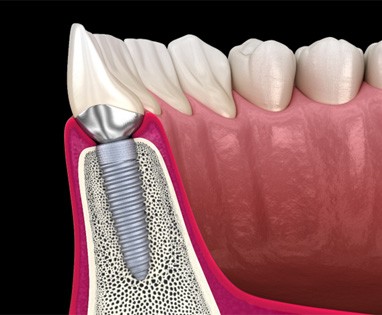
When your mouth has fully healed following abutment placement, we’ll take an impression of your smile in its current state. The impression will be sent to a trusted dental lab, where trained ceramists will create a crown, bridge, or denture out of tooth-colored materials. They’ll work to make your final restoration look as natural as possible so that the average observer won’t be able to tell the difference between it and your natural teeth.
Once the restoration is complete, it will be sent to our practice. When it arrives, we’ll reach out to you to schedule one last appointment. During your visit, we may need to make a few adjustments to make sure that your new teeth fit comfortably in your mouth. When everything’s ready, we’ll place it on your implants and use the abutments to secure it. Your new smile will finally be complete!
Benefits of Dental Implants
After the dental implant process is complete, you’ll be able to enjoy a set of comfortable, beautiful new teeth that look and feel just like the ones you lost, if not better! Because implants are designed to fuse with the bone tissue like the roots of a natural tooth, they are virtually indistinguishable from natural teeth in every way. They offer unmatched stability, functionality, comfort, and longevity, plus they benefit your oral and overall health in ways that traditional options like dentures and dental bridges simply can’t. Read on as we cover some of the most important ways dental implants can improve your day-to-day life, wellbeing, and quality of life.
Day-to-Day Benefits

Replacing your missing teeth with a reliable solution like dental implants will have a tremendous influence on your daily life. As you go about your day with your newly rebuilt smile, you can expect to enjoy:
- Easy maintenance: Dental implants can be cared for just like natural teeth, no extra brushes, special cleaning solutions, or new routines needed!
- Restored biting power: While traditional tooth replacement choices only restore 25-30% of your biting force, dental implants can give you 80% or more of your chewing power, allowing you to eat all your favorite foods easily and comfortably.
- No slipping or sliding: Traditional dentures and bridges will lose their fit over time, which can cause them to feel loose and unstable. Your dentures may even pop out while eating or speaking! With dental implants, you can show off your smile confidently and without slippage.
Health Benefits

Regaining a complete smile is about much more than just looks. Not only will you enjoy a beautiful smile, but dental implants offer health benefits like:
- Improved oral health: Dental bridges are supported by remaining teeth, which can lead to tooth sensitivity. Similarly, dentures rest on top of the gums, which can irritate the tissue. Dental implants are fully self-supporting, making them the healthiest option for your smile.
- Maintain your jawbone: Dental implants are the only tooth replacement option that stimulates the jawbone and prevents its deterioration after tooth loss, as well as the sunken, aged appearance that often accompanies missing teeth.
- Better overall health: Countless studies show that replacing missing teeth and maintaining good oral health can help lower your risk of systemic health issues like arthritis and heart disease.
Long-Term Benefits

Dental implants are a tooth loss solution you can rely on for decades to come. Some of the long-term benefits you can expect from this state-of-the-art solution include:
- Results that last a lifetime: While dentures and dental bridges need to be replaced every 5-10 years, dental implants can last for 30 years or more. In fact, most patients enjoy their dental implants for a lifetime!
- Reliable long-term success: Numerous studies have found that dental implants boast an astonishing success rate of over 95%, even 10 years after placement!
- Potentially extend your lifespan: Researchers have discovered a link between the number of teeth (or teeth replaced by dental implants) a patient has and their overall lifespan. Theoretically, dental implants can help you live longer!
Who Dental Implants Can Help

The numerous advantages of dental implants make them the preferred choice of dentists and patients, but are they suitable for you? The procedure has a 95% success rate, but it could still fail if you don’t have enough bone in your jaw or suffer from gum disease; these conditions won’t necessarily prevent you from getting implants, but they will add a few preparatory steps to the process. Also, you should bear in mind that the surgery will be different depending on how many teeth have been lost.
Who Is a Good Candidate for Dental Implants?

To qualify for dental implants, you need to meet some criteria: you must have jawbone density that will support the implant posts, and you must not have any oral infections, cavities, or other issues. As long as you have a healthy mouth and strong jawbone, we should be able to proceed with treatment. As mentioned above, if you have gum disease or have weaker tissue, we can perform certain procedures to address these concerns and put you in a better position to get implants. Your consultation gives us the opportunity to make sure you’re ready.
Missing One Tooth
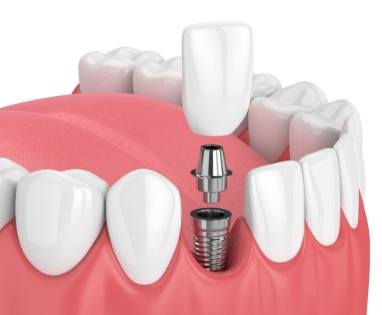
You can lose a tooth at any time due to decay or an injury. Before it is removed or shortly after it goes missing, it is recommended to have the area assessed to determine the optimal time for implant replacement. Once a single implant has been surgically placed, a process called osseointegration occurs; this basically means that the bone heals around the implant and fuses with it, making it part of the body from that point forward. A customized crown is placed after osseointegration is complete, which usually takes 3 months.
Missing Multiple Teeth
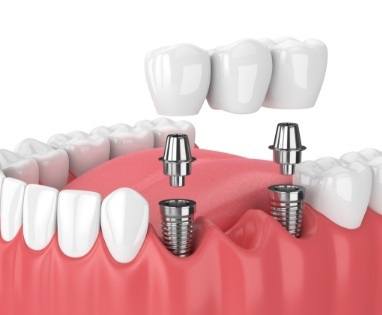
You’ll receive one implant for a single crown, but the number of implants you need isn’t always equal to the number of teeth that are missing. For example, if four adjacent teeth are gone, we can place two implants to support a dental bridge – a special prosthetic made of two crowns and at least one false tooth. Traditional bridges rest on natural teeth, but we can avoid making permanent changes to the existing dental structure if implants are used instead.
Missing All Teeth
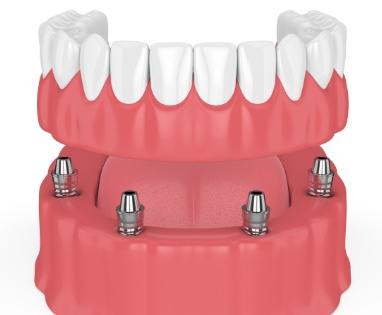
Even if you have lost all your natural teeth, a completely restored smile is possible! With 4 or more implants, we can replace all the teeth on the upper jaw, the lower jaw, or both with comfortable, dazzling implant dentures. Our full arch dental implant restorations are made only out of the finest-quality materials and can last a lifetime with minimal maintenance. You’ll never have to worry about your new teeth slipping out of place because they will be anchored directly to the jawbone, and you won’t have to avoid your favorite foods.
Understanding the Cost of Dental Implants

Even if you’re a viable candidate for dental implants, you may be reluctant to ask about the procedure simply because you’re worried at the cost. At Pioneer Periodontics, we don’t want financial concerns to stop you from enjoying a strong, healthy, beautiful smile. If we believe dental implants are your best option, we’ll work with you to figure out the cost of the procedure and what you can do to fit it into your budget. You can call us today to schedule an initial consultation where you can receive an accurate estimate.
Types of Dental Implants
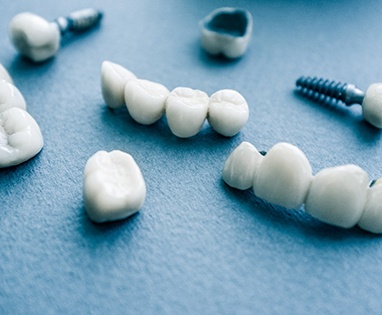
Before we can determine the cost, we need to figure out what kind of dental implant treatment you’ll need. Some patients only have a single tooth that needs to be replaced while others have lost entire arches. Dental implants are extremely versatile; with the right number of posts, they can support a single crown, a dental bridge, or even full dentures. It goes without saying that the final cost of the treatment largely depends on these factors; one implant for a crown will not have the same price as four implants for dentures.
Are Dental Implants Worth the Investment?

Many patients don’t realize that despite having a higher price tag at the onset, dental implants are actually the more cost-effective option compared to other forms of tooth replacement. They can last for decades and sometimes the rest of your life, meaning you won’t have to pay for repairs or replacements as often as you would for a more traditional restoration. Furthermore, implants help preserve the bone in your jaw, thus helping prevent additional tooth loss and other oral health problems. For these reasons, dental implants are often considered a long-term investment that’s definitely worthwhile.
Does My Dental Insurance Cover Dental Implants?

That depends on what insurance you have. Many companies consider the implants themselves to fall under the category of cosmetic treatment and thus won’t help pay for them; that said, they’ll often help pay for bone grafts or other treatments related to the implant process. If you schedule a consultation, we can help you figure out what percentage of the treatment your insurance will help pay for.
Advanced Dental Implant Procedures
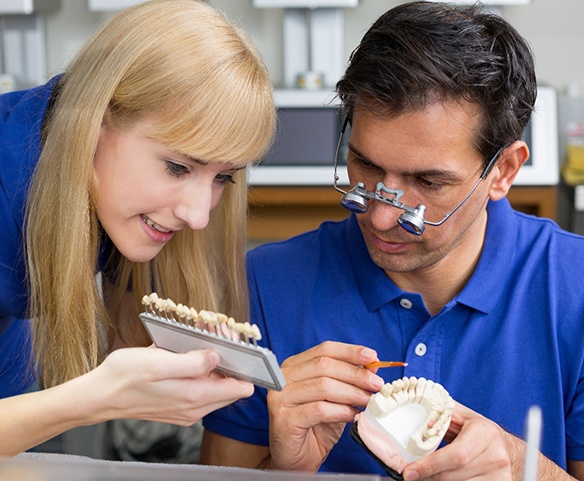
Dental implants are far from new; they were first used in 1969, and since then a lot of research has been dedicated to perfecting them. As a result, several procedures have been developed to help more patients enjoy them. Has your jaw started to deteriorate or shrink away since you’ve lost your teeth? Do you still have a tooth that needs to be removed? At Pioneer Periodontics & Implant Dentistry, Drs. Rutledge, Le, and Bradley have the modern solutions you need. Call us today to set up a consultation and learn about advanced dental implant procedures in Lincoln, NE.
3D Imaging
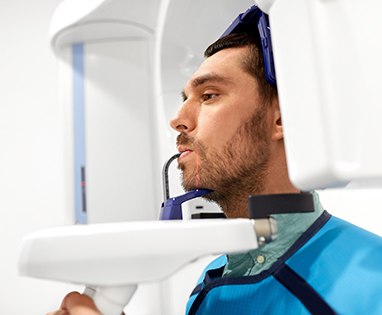
Some implant placements are more complex than others. The post needs to be inserted into the bone in just the right spot in the jaw to avoid nerve damage or other issues. Oftentimes the margin for error is very small, which is why 3D imaging is often an invaluable tool. Using a special cone beam X-ray machine, we can closely examine the mouth, teeth, and jaw, giving us a complete understanding of your anatomy to aid in successful diagnosis, treatment, and recovery.
Tooth Extractions
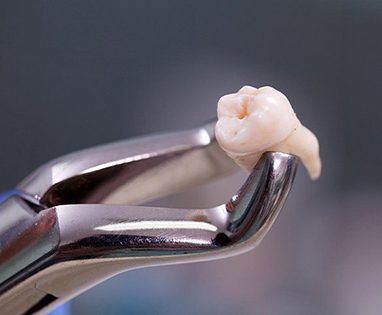
There’s no need to wait until a tooth falls out due to decay or trauma. If we decide that you’d be better off with an implant-supported prosthetic, we can perform one or more tooth extractions before the implant surgery. This is often necessary if you need implant dentures, as there could still be multiple teeth left in the arch in question. We may be able to immediately place an implant following an extraction in specific situations.
Learn More About Tooth Extractions
Ridge Preservation
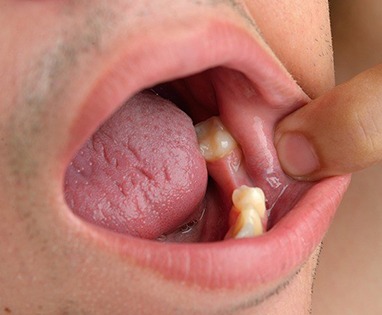
While we can try and restore lost density to the jaw, the implant process will be much easier if bone loss never occurs in the first place. Ridge preservation lets us reduce the degeneration that occurs after an extraction so that there will still be plenty of bone height and width available when you’re ready for implant surgery. A bone graft is placed into the socket of the tooth that was taken out so that it can help preserve the bone and tissue.
Bone Regeneration
Once a tooth is lost, the area of the jaw where it was located will no longer receive the benefits of biting and chewing. This signals to the rest of the body that the bone in this area isn’t needed anymore, which is why it breaks down. However, your body can produce new bone tissue under the right circumstances. A bone regeneration procedure is meant to encourage bone growth of the degenerated area by placing a bone graft at the site and stimulating cells to regrow bone in the area.
Bone Grafting
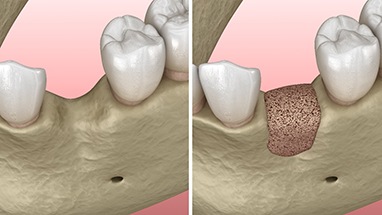
A bone grafting procedure takes donor bone from either another part of your body, a cadaver, or an animal and surgically inserts it into your mouth, where it eventually becomes part of the rest of the jaw. Not only can this help reverse bone loss, but it can also be used to build up a ridge that’s simply too thin to support implants. A type of bone graft called a sinus lift can be used to move the sinus cavity away from a potential implant site near the back of the upper jaw.
Sinus Lifts
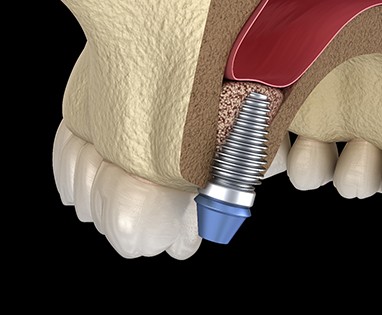
In the upper jaw where the maxillary sinus may impose a height limitation for implant placement, a sinus lift can be completed to increase the height of the bone. Instruments are used to lift the sinus membrane and a bone graft is placed into the area to increase the bone height. The bone placed will over time become your own bone. This can be completed simultaneously with implant placement or may need to be done before implant surgery depending on how much bone height there is initially.
Dental Implant Failure & Salvage
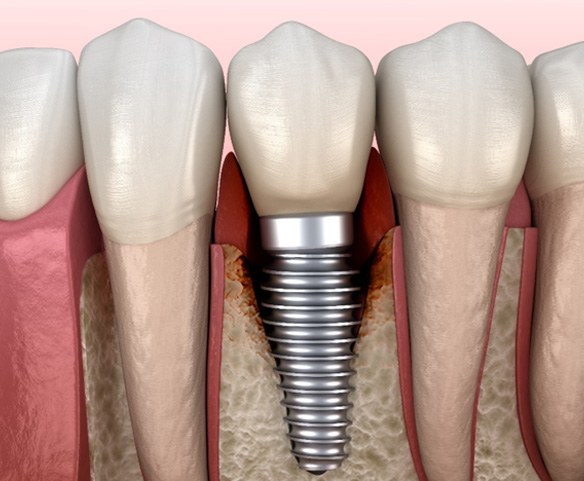
We will naturally do everything we can to ensure the success of your dental implants, but we’re also prepared to help if anything goes wrong with your newly rebuilt smile. If you have any reason to think that your dental implants may have failed (such as a post that has come loose), call us immediately to schedule an appointment. Our team can help you figure out what the problem is and devise an appropriate treatment plan.
Learn More About Dental Implant Failure & Salvage
Dental Implants Post-Op Instructions

After dental implant surgery comes the recovery process. Our team will give you detailed instructions for taking care of your mouth during this time so that everything goes as expected. Below are some general instructions that can give you an idea of what you’ll need to do after your surgery; we may give you more specific directions depending on your unique needs.
What to Do Directly After Dental Implant Surgery

You should plan on resting at home for a few days (three or four on average) after your implant surgery. During the initial recovery period, you need to focus on protecting the blood clot that has formed around the surgery site. This blood clot plays an important role in the healing process, and if it becomes dislodged it can cause significant discomfort. Keep your blood clot safe by:
- Not spitting
- Not drinking from straws
- Not smoking
- Not touching the surgery site
Common Side Effects When Recovering from Dental Implant Placement

Gradual and intermittent bleeding, swelling, and general discomfort are all perfectly normal symptoms after dental implant surgery. They should gradually disappear on their own; please call us immediately if they grow worse or last longer than normal. In the meantime, there are steps you can take to control your side effects:
- If bleeding occurs, put pressure on the area with a clean piece of gauze.
- Hold a cold compress on your cheek or jaw to reduce swelling.
- Prescribed or over-the-counter medications can be used to alleviate any pain you might be experiencing.
Your Diet After Dental Implant Surgery

You should only eat soft foods while your mouth is still recovering from implant surgery. Pasta, scrambled eggs, pudding, ice cream, yogurt, and mashed potatoes are all good choices for a soft food diet. Stay away from hot and spicy foods, though; they can irritate the surgery site and delay the healing process.
You can eat solid foods again after your discomfort has faded, but you’ll need to take care not to chew directly on the surgery site. Your implant still needs time to fuse with the jawbone, and exposing it to too much pressure could prevent it from doing so.
Post-Op Health & Oral Hygiene

You need to keep your mouth clean during your recovery to minimize the risk of infection. You may brush after the day of your surgery, but be careful not to disturb the implant site in the process. We also recommend rinsing with salt water or a prescription mouth rinse after every meal to wash away food debris and harmful bacteria. Make sure that you do not use any kind of mouthwash that has alcohol in it.
What to Do After Your New Teeth Are Attached

Once your mouth has healed and your implants have bonded with your jawbone, the last step is to attach the final prosthetic to the implant post(s). Your gums may be somewhat sensitive afterward, but you should be able to manage it with ibuprofen or another kind of pain medication. Call us immediately if you notice swelling or bleeding; those types of symptoms should not be occurring at this stage.
Maintaining & Caring For Your Dental Implants

When it comes to dental implant care in Lincoln, you’ll want to make sure that you understand the ins and outs of maintaining these custom prosthetics so that they will remain in the best shape year after year. Dental implants are an investment, not only in your money but also your time, so ensuring that they do not fail is a priority. You can accomplish this by keeping these following tips in mind.
Making Oral Hygiene a Priority

Dental implants may not suffer decay like regular teeth, but they can be affected should natural pearly whites become diseased. It is also possible for gum disease to negatively impact these artificial teeth; especially should the bone break down so much that it causes teeth to loosen. To keep these common oral health problems from becoming a reality, you’ll need to make oral hygiene a priority. This means brushing your teeth after every meal and flossing to eliminate bad oral bacteria.
Eating a Healthy Diet

Sugars and starches may make up some of the most delicious foods you eat, but you’ll need to expand your pallet and save these foods as treats. The reason is that they can cause gum disease and dental decay if you’re not careful – putting your dental implants at risk. Instead, you’ll want to incorporate healthier food options such as leafy greens, lean proteins, fruits and vegetables, and low-fat dairy options.
Breaking Bad Habits

Unhealthy habits can be hard to break, but if you want to reduce the chances of damaging your new teeth, you’ll need to give up things like smoking, excessive alcohol consumption, biting your fingernails, chewing on inanimate objects like pens and pencils, or eating ice. These are all potentially harmful problems that can lead to damaged teeth and implants, resulting in a trip to the emergency dentist’s office.
Protecting Your Dental Implants

Protecting dental implants means wearing a proper mouthguard if you decide to engage in any kind of sports. While on the field or court, you may suffer an accidental fall or hit that can cause your pricey implant(s) to break or be knocked out. The same can also be said if you grind your teeth at night. A customized nightguard can serve as a barrier to protect your natural teeth and custom prosthetics from becoming damaged as a result of teeth grinding and clenching.
Scheduling Regular Dental Checkups

Continuing to see a qualified implant dentist is one of the most pivotal things you can do while wearing dental implants. Every six months, you should expect to see your dentist for regular checkups and teeth cleanings, as these visits not only serve to protect your natural teeth but also give your dental team a chance to examine your existing implants and determine if anything needs to be addressed with treatment.
Dental Implant Technology
Successful dental implant treatment depends on several factors, including a patient’s health, a dentist’s skill, and the technology used throughout the treatment process. Here at Pioneer Periodontics & Implant Dentistry, we are proud to use state-of-the-art instruments and techniques to make the tooth replacement journey as easy and low-risk as possible for each and every patient. What are some of the specific technologies that we employ? Continue reading below to learn about a few.
3D Cone Beam Imaging/3D CT Scanning
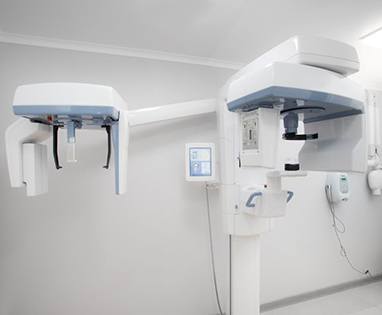
A regular digital X-ray can tell us a lot about your oral health and your remaining natural teeth. However, it does not deliver the level of detail necessary for us to precisely plan the details of your dental implant surgery.
That is why we have a 3D cone beam scanner, also called a CBCT scanner, in our office. It uses a cone-shaped beam of radiation to capture highly detailed images of your jawbone, teeth, nerves, and connective tissues. It can help us to anticipate any challenges that might affect your treatment. We can also use our CBCT machine to check on the health of your implants after they are placed in your jawbone.
Digital Impression System
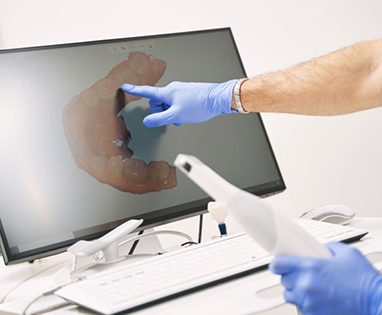
We want your new prosthetic teeth to look both beautiful and natural in your mouth. Even more importantly, we want them to function optimally and provide you with a comfortable, strong bite.
To help us design the perfect crown, bridge, or denture, we use a digital impression system. It uses a high-tech scanning wand to make a three-dimensional digital model of your existing teeth and gumline. It can allow us to coordinate smoothly with dental lab technicians as they fabricate your beautiful new teeth.
Digital impressions are superior to old-fashioned manual impressions, which can be inaccurate and uncomfortable.
Prosthodontic Driven 3D Printed Guides
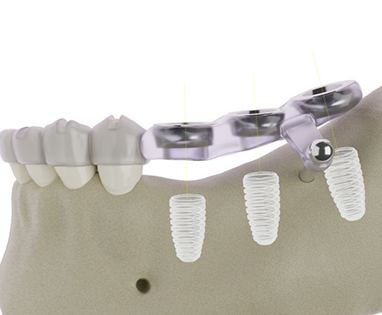
Some dentists and specialists perform freehand dental implant placement. In other words, they take an educated guess as to exactly where, how deep, and at what angle they should place dental implants. Freehand surgery is often successful. However, guided surgery is more predictable.
We use an advanced 3D printer to create custom surgical guides. These guides help us to minimize the risk of human error as we place dental implants. As a result, there may be a reduced risk of future dental implant failure.
Dynamic Navigated Surgeries

In addition to using surgical guides, we also employ the power of dynamic navigation when performing dental implant surgery. In other words, we have a computer guide us in real time as we place dental implants. Our team is able to view customized information during placement surgery so we can insert implants exactly where they need to go.
This reduces the risk of human mistakes, which can lead to a lower risk of dental implant failure. Precise implant placement can also contribute to faster healing times and a more comfortable recovery process for patients.
Dental Implant FAQs
Do you have questions about the dental implant process? Our team at Pioneer Periodontics is happy to address your concerns and equip you with the information necessary to make the best decisions for your oral health. Below, we’ve compiled some of the most common questions that we get about dental implants in Lincoln, along with our answers.
Does Getting Dental Implants Hurt?
Many patients come to us wanting to restore their smile with dental implants, but they’re concerned about the procedure because they’ve never had an oral surgery before. Even though it may sound daunting, dental implant placement isn’t as painful as it may seem. Our periodontists will use a local anesthetic in the area that they’ll be treating before they begin the surgery, which will numb it completely, so you won’t feel an ounce of pain. Additionally, we offer sedation options to help even the most nervous or sensitive patients feel relaxed and at-ease while we rebuild their smile.
What Causes Dental Implant Failure?
The dental implant treatment boasts an impressive 98 percent success rate. However, dental implant failure does happen if patients aren’t careful. When it does happen, it typically occurs when there’s an issue between the implant and the jawbone. If an infection develops, known as peri-implantitis, it could keep them from completing this process. To keep this from happening, we recommend that patients who are considering getting dental implants quit smoking and consuming alcohol leading up to their treatment. We also ask that you inform us of any autoimmune disorders that you may have that could affect your healing process after the surgery.
Why Should I Get Dental Implants from a Periodontist Instead of a General Dentist?
Periodontists are experts in saving smiles affected by oral health problems like gum disease. This makes them the ideal specialists to receive dental implants from. Not only are they able to provide you with a keen eye for detail throughout the process, but they’re also able to conduct the dental implant placement themselves, along with other advanced preparatory procedures like tooth extractions and bone grafting.
A general dentist may not have the advanced training or skills necessary to complete the entire treatment process under one roof, making you travel to a specialist and then back to their practice.
Will I Have to Take Time Off Work for Dental Implant Surgery?
The answer to this question is generally yes, but it may not be as much time as you’re expecting. Many patients are able to return to their regular routines just one or two days after the initial dental implant surgery. That said, some individuals will need to take more time off work than others, especially if they have physically demanding jobs. Our team will let you know how long you should plan on resting at home to ensure a smooth recovery.
Can I Get Dental Implants If I’m Diabetic?
High blood sugar levels can potentially impair your body’s ability to heal after dental implant surgery, which can lead to complications. Nevertheless, as long as your diabetes is properly managed, there’s a good chance that you can still be considered a viable candidate for dental implants. Before you begin the dental implant process, you should talk to your regular physician to see what steps they recommend for keeping diabetes under control.
Do Dental Implants Decay?
Dental implants mimic natural teeth in many ways, but one important difference is that they are not made of enamel. Therefore, you do not have to worry about them developing cavities. That doesn’t mean you can afford to neglect them when it comes to oral hygiene, though; if plaque and tartar accumulate around your implant posts, they could lead to an infection of the gums that ultimately results in dental implant failure. As such, don’t forget to clean your dental implants and the area around them while brushing and flossing.
Is There Anything I Shouldn’t Eat with Dental Implants?
Once the dental implant process is complete, your new smile will give you the freedom to eat virtually any kind of food without issue. However, you will still want to exercise caution around foods that are particularly chewy or sticky, as they could potentially pull your prosthesis off your implant posts. For that matter, it’s best not to bite down on overly hard foods such as ice cubes, as doing so can end up putting an excessive amount of pressure on your dental implants and breaking them.
Are Dental Implants an Eligible FSA Expense?
An FSA (Flexible Spending Account) can be used to pay for a variety of medical and dental treatments. In many cases, this can include dental implants since they can be used to restore your oral health by replacing your missing teeth. That said, it should be noted that many FSAs come with a cap that limits the amount that you can spend during a single year. We can review your FSA with you and make sure that you fully understand the details so that you can get the most out of it.